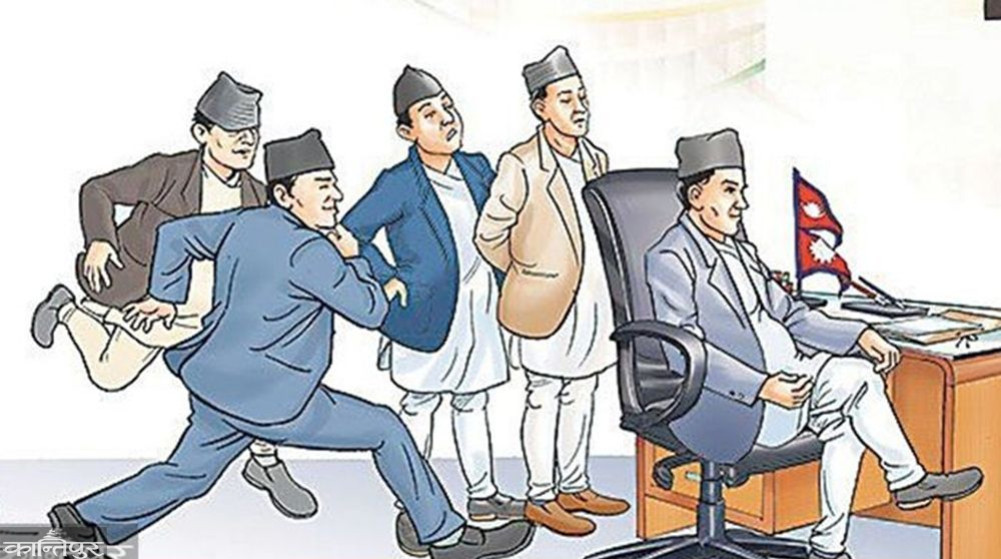Koshi's Dalit Rights Bill was caught in concept
We use Google Cloud Translation Services. Google requires we provide the following disclaimer relating to use of this service:
This service may contain translations powered by Google. Google disclaims all warranties related to the translations, expressed or implied, including any warranties of accuracy, reliability, and any implied warranties of merchantability, fitness for a particular purpose, and noninfringement.


With the aim of promoting, empowering and developing the rights of the Dalit community, who are at the back of the social structure, the creation of the 'Dalit Rights Promotion Bill 2079' was started in Koshi towards the last term of the first state assembly.



The Chief Minister was Rajendra Kumar Rai when the Bill started the construction work . Rajan Rai in the Ministry of Social Development. However, despite the change of power six times in the second provincial assembly formed after the November 2079 election, let alone the drafting of the Dalit Bill, the concept paper has not been approved.
According to Nirmal Bhattarai, the legal officer of the Ministry of Social Development, the drafting of the Watt Bill was started in the financial year 2078/079. For the draft of the bill, the suggestions of four more stakeholders from Panchthar, Khotang, Udaipur and Sunsari districts were collected. During the collection of
suggestions, the ministry has already spent a budget of around 1.8 million. According to Bhattarai, the concept was submitted to the Cabinet for approval on 22 Chait 2079. It has been sent to the committee from the Cabinet for discussion,' said officer Bhattarai, 'after the meeting of the committee, it has come back for further discussion with the Chief Attorney and stakeholders.'
The concept of the Dalit Bill has been stuck in the ministry for two years. The bill cannot be drafted until the concept paper is approved. As a rule, the concept must first be submitted and passed by the Parliament. And finally the bill becomes. There is a provision that the bill must be passed again in the parliament to make it a law.
Durga Baral, the head of the division of the ministry, claims that the ministry is in favor of passing and implementing the law as soon as possible. "There is a problem because the ministers have been changed," Baral expressed her grief, "Koshi's political fluidity has directly affected the law making." Baral said that even though the ministry has been preparing the concept for the creation of the
Act, two years have passed, "We will fix it, the power will change". The main reason for the delay in making the law is the power change.'
This is the formation process
Proposed for formation at the state and local levels with the aim of working for Dalit rights. The provincial committee of the 'Dalit Rights Promotion, Empowerment and Development Committee' will have 12 members with the Minister of Social Development as the Chairman and the Minister of State for Social Development as the Co-Chairman.
in which there will be a vice president who will be appointed by the Council of Ministers from among the Dalit leaders after passing 12th standard . Similarly, four people including two women who are active in the upliftment and development of Dalits, one from the Provincial Planning Commission, the Secretary from the Ministry of Economic Affairs and the Ministry of Planning, the Secretary of the Law Branch of the Chief Minister and the Council of Ministers, the Dean of the Provincial University, the Medical Superintendent of the Provincial Hospital and the Joint Secretary of the Ministry of Social Development will be the Member Secretary. Arrangements are about to be made. This committee is based on Article 24 of the Constitution and caste In addition to the effective implementation of the rights provided by the Discrimination and Untouchability (Offenses and Punishments) Act, 2068, it is said that special policies, plans and budgets will be created and implemented for the promotion, empowerment, untouchability and practical end of caste discrimination.
At the local level as well, a 13-member 'Local Dalit Rights Promotion, Empowerment and Development Committee' will be formed with the chairman of the rural municipality or the chief chairman of the municipality. Whose vice-president will be one vice-president appointed by the rural municipality president or city chief from among the Dalit leaders who have passed 12.
Similarly, 2 of the village council or city executive members, 2 appointed by the village head or municipality head among the local Dalit women ward members, 2 local party representatives, 1 appointed by the head of the local campus head, 1 head of the local hospital, for at least 5 years Among those active in the field of Dalit rights, 2 including a woman nominated by the local government and It is arranged that the chief administrative officer of the rural municipality and city will be a member.
Provision has been made in the Act that this committee of the local government can make policy decisions in the field of Dalit rights just like the provinces. The act also envisages a committee to eliminate and monitor caste discrimination and untouchability in both provincial and local governments.
In the state, under the chairmanship of the Chief Minister, the Minister of Internal Affairs and Law, the Minister of Social Development, a women committee of 3 members of parliament from the Dalit community in the state assembly, the state attorney general, 2 women nominated by the state government among those who have been active in the field of Dalit rights for at least 5 years, the state police chief. Members and Chief Minister and Secretary of the Council of Ministers are not member secretaries.
At the local level, a 7-member committee will be formed with the chairman of the municipality or the chief chairman. It is going to be arranged that there will be a vice-president of the municipality or a chief of the committee, one of the Dalit members of the executive committee, two women who have been active in the field of Dalit rights for at least 5 years, including two women nominated by the municipality chairman or chief, one local police chief and one member secretary of the local staff chief.
It is said that both state and local governments will monitor and supervise various actions related to Dalit rights. Financial, material and technical resources and means for monitoring will be managed by the Chief Minister's Office in the province and the relevant municipalities at the local level.
This is the arrangement In the
act, it is said that provision of free education will also be made to the Dalit community. According to Articles 31 and 40 (2) of the Constitution and the Compulsory and Free Education Act 2075, it is stated that the state and local governments will manage and implement compulsory, quality and free education with scholarships for every Dalit student from primary level to high school.
It is going to be proposed in the law that health services will be provided free of cost to the Dalit community. A free 'health care card' will be arranged to provide health services to Dalits at the local level.
The state government will provide the Chief Minister's Social Security Special Fund targeting the elderly of the Dalit community. A special allowance will be provided through the state government program for single women and men of the Dalit community.
The development of traditional skills and business of Dalits, land will be made available for landless Dalits, houses will be made available to the homeless, and proportionate and inclusive representation will be arranged in all bodies of the state government. Arrangements will be made for the abolition of untouchability and caste discrimination.
In addition, the state government has also envisioned a ration card to provide rations at subsidized rates to the poor and Dalit communities. Social Development Minister Panchkarna Rai claimed to make a law and pass it in the parliament as soon as possible. "Due to the political instability of Koshi, the bill has not become law," Minister Rai said, "There will be no delay from the ministry in making the law."
 प्रकाशित : जेष्ठ २७, २०८१ १८:५७
प्रकाशित : जेष्ठ २७, २०८१ १८:५७

 २१.१२°C काठमाडौं
२१.१२°C काठमाडौं
















